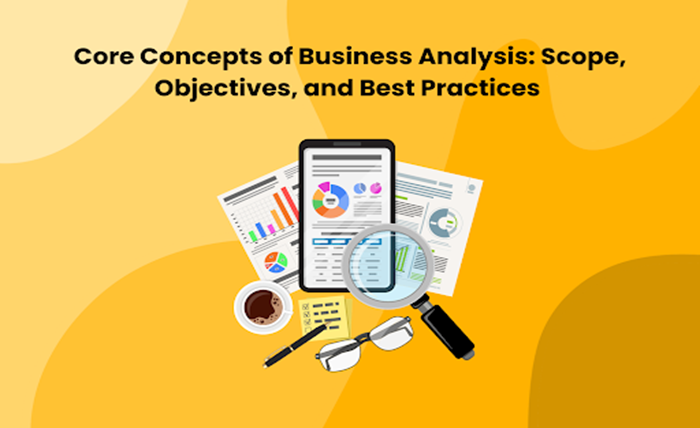The role of a business analyst has become increasingly crucial in modern business. Whether it’s optimizing processes, identifying opportunities for growth, or ensuring efficient use of resources, business analysts play a pivotal role in driving organizational success. This blog explores the core concepts of business analysis, including its scope, objectives, and best practices, shedding light on its significance in today’s business environment. If you’re interested in pursuing a career in this field, consider enrolling in a Business Analysis Course to gain the necessary skills and knowledge. Let’s delve into What is Business Analysis and how it can benefit businesses across industries.
Table of Contents
- Scope of Business Analysis
- Objectives of Business Analysis
- Best Practices in Business Analysis
- Business Analysis Course: A Path to Success
- What Is Business Analysis?
- Conclusion
Scope of Business Analysis
A wide variety of tasks are included in business analysis to determine a firm’s possibilities, challenges, and demands and come up with solutions for them. It entails comprehending an organisation’s structure, rules, and procedures and examining its systems and processes to maximise effectiveness and efficiency. Corporate analysis covers a wide range of corporate activities, including strategy, finance, marketing, operations, and the IT sector.
Objectives of Business Analysis
Making educated decisions within an organisation is the main goal of business analysis. Through the collection and examination of data, business analysts provide significant insights that assist stakeholders in comprehending the present condition of the enterprise, pinpointing opportunities for improvement, and formulating plans to accomplish their objectives. Transforming business needs into technically feasible specifications is another way business analysis attempts to close the communication gap between IT teams and business stakeholders.
Best Practices in Business Analysis
Professionals who want to succeed in business analysis must adhere to a few best practices that guarantee the accomplishment of their projects. Among the crucial best practices are:
- Understanding the Business Context: Business analysts should deeply understand the business context in which they operate. To provide relevant insights and suggestions, this calls for an awareness of organisational objectives, competitive environment, and industry trends.
- Effective Communication: Effective communication is critical for business analysts to gather requirements, convey complex ideas, and facilitate stakeholder collaboration. They should be able to speak to both technical and non-technical audiences with clarity and conciseness.
- Requirements Management: Managing requirements effectively is essential for the success of any business analysis initiative. To guarantee that the finished solution satisfies the business needs, this entails documenting, prioritising, and verifying requirements.
- Analytical Skills: Business analysts need strong analytical skills to interpret data, identify trends, and make informed recommendations. They should be skilled in modelling and data analysis tools and procedures.
- Adaptability: corporate analysts must be able to adjust to changes in the ever-changing corporate environment. They must rapidly learn and adapt to new business procedures, technology, and approaches.
Business Analysis Course: A Path to Success
Enrolling in a business analysis course might be a wonderful method to reach your objectives, whether you’re thinking about a career in business analysis or just want to improve your abilities in this area. A thorough course will review the essential ideas, instruments, and methods used in business analysis, giving you the know-how and abilities required to succeed in this position. Furthermore, many courses include practical experience in case studies and projects, which let you apply what you’ve learned to actual situations.
What Is Business Analysis?
Business analysis is comprehending a company’s demands and coming up with solutions. It uses a systematic approach to identify, evaluate, and resolve business issues to enhance organisational effectiveness. As a point of contact between technical teams and business stakeholders, business analysts ensure that the solutions created meet the latter’s goals.
Conclusion
Organisations may accomplish their strategic goals and propel company transformation with the help of business analysis. Professionals may contribute to their organisations’ success by knowing the goals, best practices, and scope of business analysis. Consider taking a business analysis course to work in this industry or improve your abilities. You’ll get the skills and information you need to succeed in this exciting and fulfilling area.




